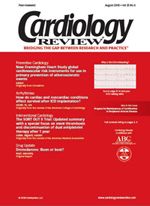Undiagnosed Diabetes and HDL Cholesterol and Plaque
This month’s Cardiology Review features a CME article in the diabetes and CAD sections on the prevalence and risks of undiagnosed diabetes among 7310 patients who had undergone coronary artery bypass surgery. The authors, Dr Achim H. Lauruschkat and associates from Germany, found that approximately 5% of their patients had previously undiagnosed diabetes and this represents an important independent risk factor for increased morbidity and mortality. Dr Harold Lazar, our cardiac surgical consultant, prefers to use the term “untreated diabetes” because the German study reflects what happens when elevated blood glucose levels are not aggressively treated during coronary artery bypass surgery. In a second CME article, this one in the lipid and stroke sections, Dr Stein Harald Johnsen and colleagues from Norway evaluated the relationship between HDL-cholesterol levels and plaque progression in the carotid arteries of 1952 patients with pre-existing carotid atherosclerosis followed for 7 years. The authors found that the HDL-cholesterol level was inversely related to plaque growth. Our vascular surgical consultant, Dr John Ricotta, points out caveats to this study indicating the “limited influence of any single factor on plaque progression.”
In the heart failure section, Swedish author Dr Ronnie Willenheimer describes a clinical trial (CIBIS III) involving 128 hospitals in 18 European countries. More than 1000 selected patients with mild-to-moderate congestive heart failure were randomized to either a beta blocker first or an ACE inhibitor first, then placed on a combined regimen for a mean of 1.2 years of follow-up. Dr Richard Stewart discusses strategies for initial treatment of heart failure in his commentary. In the arrhythmias section, the comparative benefits of rate control versus electrical cardioversion in atrial fibrillation are discussed by Dr Michiel Rienstra and colleagues from The Netherlands. Their study included 522 patients, of whom 192 were female. Gender differences in outcome were noted by the authors and are discussed at length by Dr Joseph Dell’Orfano in his commentary. Finally, Dr Stephen Glasser provides a helpful discussion of factors that influence randomized controlled trials, including causal inference, in the latest installment of his series “Fundamentals of Clinical Research.”
